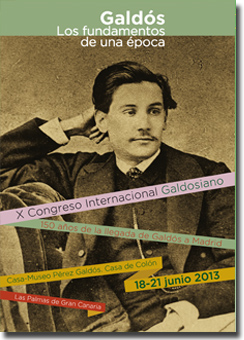EL «HUERTO FRONDOSO DE LOS RECUERDOS». LA EXPERIENCIA GALDOSIANA ANTE EL DEBATE ACTUAL DE LA MEMORIA HISTÓRICA / THE “LUSH GARDEN OF MEMORIES”. THE GALDOSIAN EXPERIENCE BEFORE THE CURRENT DEBATE OF THE HISTORICAL MEMORY
Palabras clave:
Historia, Literatura, Memoria, Análisis crítico, History, Literature, Memory, Critical ReviewResumen
En el debate actual levantado al calor de la ley de la ‘memoria histórica’ se ha llegado a separar la historia de la memoria del tal modo que la preocupación por esta apenas si rebasa el marco cronológico de lo que se llama el ‘tiempo presente’ o ‘la historia actual’. Sin embargo, analizando la generalidad de la obra de Galdós, puede comprobarse cómo ofrece muchas y ricas observaciones defensoras de lo denominó «el huerto frondoso» de sus recuerdos. Sin ir más lejos, en las Memorias de un desmemoriado —título no baladí al respecto— en las que el recurso a ‘a memoria’ fue una tara tan elemental como importante. Este trabajo estudia la cuestión a la luz de los textos galdosianos para destacar cómo, en sí mismos y en su evolución, demuestran que Galdós, perfectamente consciente del carácter artificial y móvil entre el pasado y el presente, y entre la historia y la memoria, conjuga la apelación a una y a otra (la primera firme, la segunda desconfiable) en función de los tiempos históricos y su actitud personal hacia ellos; y que no duda en sumar la memoria de lo vivido a la hora de organizar, escoger, e incluso tomar partido en su novelización del pasado.
In the current debate raised in the heat of the law of ‘historical memory’ it has come to separate the history from the memory, thereby, the concern about it barely exceeds the chronological framework of what is called the ‘present time’ or ‘current history’. However, analyzing the generality of the work of Galdós, it can be seen how it offers many rich defenders observations of what he called «the lush garden» of his memories. Without going any further, in the Memorias de un Desmemoriado —title not trivial in this regard— in which recourse to ‘a memory’ was as an elemental as an important task. This work studies the issue in galdosian texts to highlight how, in themselves and in their evolution, it shows that Galdós, perfectly aware of artificial and moving character between the past and the present, and between the history and the memory, combines the appeal to one and another (the first firm, the second unreliable) based on historical times and his personal attitude towards them; and it doesn’t hesitate to add the memory of lived experiences to organize, choose, and even take side in his novelization of the past.



